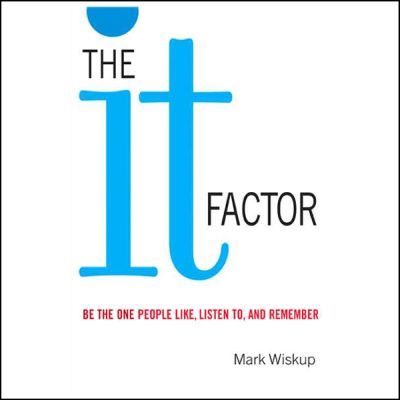Is It Worth It To Drop Several Hundred Dollars on a Writing Conference?
29
Join My Quasi-Secret Word Nerd Facebook Group Maybe?
8
How I Learned to Live and Write with Intention
6
Freelancedom Book Club Discussion: The It Factor
30
 When I chose The It Factor last month as our first book club book, I didn’t really expect to be so put off by it. The Amazon reviews were, for the most part, overwhelmingly positive, and its subject matter was one that — as an introvert with social anxiety — I couldn’t get enough of.
When I chose The It Factor last month as our first book club book, I didn’t really expect to be so put off by it. The Amazon reviews were, for the most part, overwhelmingly positive, and its subject matter was one that — as an introvert with social anxiety — I couldn’t get enough of.
But the book  made me angry. Why? The author seemed to have little respect for the readers he was trying to help, blaming their inability to connect with other people on arrogance and laziness.
Is it just me? Is my resentment warranted? Am I just not the intended audience for this book?
Either way, I still felt as if the book contained a lot that was worth discussing. So without further adieu…
1. The author seems to believe that those reading his book suffer from an abundance or arrogance and laziness. He thinks we have a voice in our heads, telling us that what we have to say is worth its weight in gold. But I feel as if the opposite is true. I’m an introvert who loses energy quickly in social settings. I have social anxiety, which makes me feel awkward and self-conscious. And while I have no problem asking people about themselves, I have problems talking myself up, because I fear coming across as a sleazy self-promoter. I also worry about being boring. What do you struggle with when it comes to finding your own It Factor?
2. Wiskup writes that we should talk about the “why” (why does what I’m saying matter to the listener?) early and often, and this I agree with. In fact, I believe that knowing your “why” is the key to creating marketing copy that sells. Have you effectively pinned down your own “why”? How?
3. In Chapter 4, Wiskup writes about painting pictures with your words. I myself have found that using personal anecdotes, and peppering them with personal details, can help an audience connect to you and your message. How have you used storytelling for your freelance business? Do you hesitate to use personal anecdotes when it comes to your networking and copywriting? If so, why?
4. In Chapter 7, Wiskup gives step-by-step instructions for creating your own elevator pitch, and reminds us that “not every pitch is right for every elevator.” His instructions are useful, demystifying the process of putting together a good elevator pitch, and his advice to prepare many different pitches is spot-on. Using his instructions, put together at least one pitch of your own, and share it in the comments section below.
5. I was intrigued by Wiskup’s steps to successful small talk in Chapter 9. I know of many introverts who hate small talk, partly because it makes them uncomfortable, and partly because it feels so phone. But, as Wiskup writes, the best networkers know that small talk is “just a step in the connection process.” Do you feel comfortable with small talk? What did you think of Wiskup’s small talk technique? What has helped you become better at small talk?
And is there anything else that leaped out at you while reading this book? I’d love to hear your thoughts in the comments section below.
Spill It: What Does Networking Mean To You?
28
Earlier this week, J. Maureen Henderson wrote a post for Forbes on what networking isn’t… and what it could be. I cheered as I read her post, because she got it. She got that networking wasn’t about desperation-fueled schmoozing. (Well. It shouldn’t be.) It wasn’t about working a room or handing out business cards willy-nilly. It was about conversation. It was about connection. It was about all the ways we connect with others on a daily basis, in a thousand different ways.
“Blogging is networking,” she wrote. “Being on Twitter is networking. Sending your BFF a job posting that you think would be perfect for her roommate is networking. Asking Jim in Marketing if he knows someone who is aces at web design is networking. When your new hair stylist asks what you do for a living and you answer her? That’s networking.”
Last year, J.M. did a video interview with me about my career coaching business. That was networking, too. One of J.M.’s blog readers saw that video and became my very first e-course student.
What else is networking?
- Maintaining a presence on LinkedIn.
- Interviewing someone for a magazine article.
- Schmoozing at the latest blogging meetup.
- Being friendly with those outside partners and publicists you collaborate with while at your day job.
- Sharing contacts with other writers.
- Making the most of your internship.
- Taking continuing education classes.
- Creating a writing group once the semester ends.
- Letting your husband talk you up to his colleagues.
- Proving your worth as a freelance writer.
- Telling your friends you’re looking.
- Chatting up your classmates at your weekly callanetics class.
- Yukking it up at the latest media party at that bar downtown.
- Keeping in touch with the young woman who taught Sword Swallowing 101 at your very first sex party.
- Spinning a crappy job offer into a more beneficial freelance relationship.
- Milking that mentor for all she’s worth.
- Approaching people for informational interviews, and accepting lunch invitations from editors at all levels.
All of the items on this list have led directly to paying work: Permalance gigs. Regular clients. Columns and regular blogging gigs. The ability to finally break into those publications I’d been eyeing. My first few full-time jobs. Freelance projects.
In fact, in some cases, the ones that — in my mind — were the furthest from networking were the ones that ended up being the most lucrative, or leading to the most interesting work.
So what does networking mean to you?

